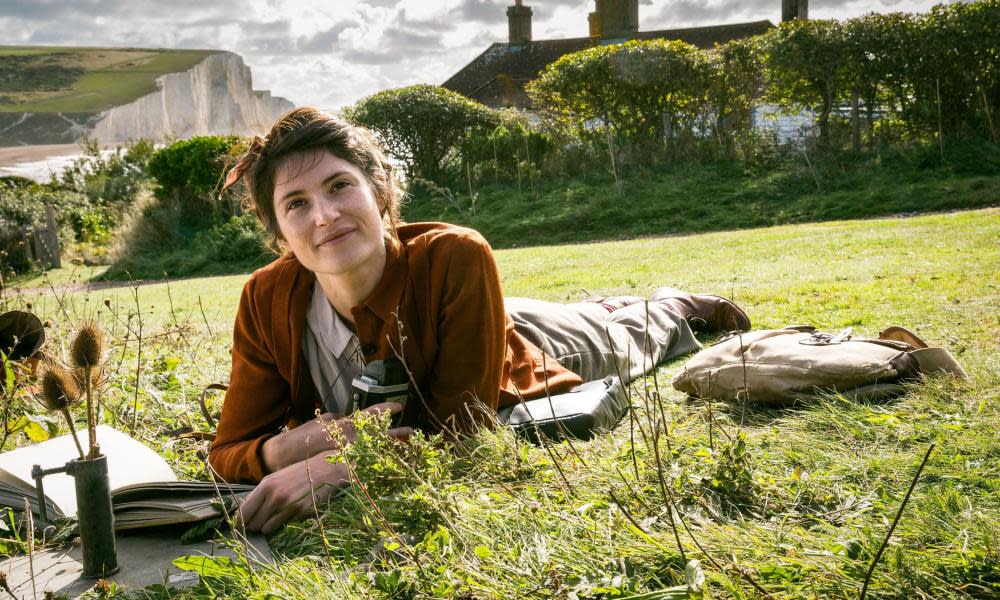Summerland review – wartime wonderment with Gemma Arterton

What a lovely, hopeful and rather magical movie this is. The feature debut from writer/director Jessica Swale, whose impressive theatre CV includes the Olivier award-winner Nell Gwynn, Summerland provides just the tonic we need in times of turmoil. A tale of love lost and found, told with wit and charm, it maintains an impressive balance between the sly and the sentimental, gently subverting mainstream formulae as it slips back and forth in time, alternating between the realist and the romantic.
We open in coastal Kent, 1975, with Penelope Wilton’s crotchety Alice rudely shooing children from the door of her cottage (“You know how you can help the aged? You can bugger off!”) so she can return to her typewriter. From here, we spiral back to the 40s, where the younger Alice (Gemma Arterton) taps away on the same keyboard. A recluse who investigates and debunks myths and folklore, searching for the facts behind the fiction, Alice is viewed with suspicion. The village children think she’s a witch or a spy; even the adults seem a bit scared of her.
When young evacuee Frank (Lucas Bond) is dumped unexpectedly on Alice’s doorstep, she has no time for him, insisting that he be re-homed. But inevitably a bond grows between the pair, with Alice slowly warming to the new arrival who seems to rekindle long suppressed feelings of affection. Meanwhile, Swale’s story spirals back further still, to Alice’s meeting with Vera (Gugu Mbatha-Raw) in the 20s and the pang of first love that now sits like a chip of ice in her heart.
“Would you think it was strange if a woman loved another woman?” Alice asks Frank, adding that “most people think it’s wicked”. But Frank is more interested in Alice’s belief that “stories have to come from somewhere” and together they start chasing castles in the sky, mirages that seem to provide a link between this world and the next.
Beautifully shot by cinematographer Laurie Rose, who lends a magic-realist edge to down-to-earth details, Summerland conjures a honey-dappled world in which the possibility of redemptive miracles gradually illuminates the dark corners of loneliness. In the central role, Arterton (who also executive-produces) is terrific, relishing the opportunity to play a character who doesn’t care how others see her. An early scene, where Alice seems to offer chocolate to a child only to steal it away, is played with wicked gusto, daring the world to think the worst. Anyone who saw the acerbic comic short Leading Lady Parts will know that Swale has a killer eye for a sharply honed twist of the satirical knife. But it’s in its more melancholy moments that Summerland really makes its mark, with Mbatha-Raw perfectly cast as the face that haunts Alice’s dreams, reminding her how much she has lost.
Smaller roles are equally well filled, with Tom Courtenay oozing avuncular charm as the schoolmaster who quips that “Shakespeare didn’t have to deal with Alice Lamb or he might have said, ‘Get thee under the table and hide!’” Top marks, too, to younger stars Bond and Dixie Egerickx, who plays Edie, “a maverick” who doesn’t “fulfil the feminine ideal” and looks set to inherit Alice’s independent mantle.
“Planes crash,” Alice tells Frank as he wonders whether to launch a model aeroplane over a cliff. “What matters is how you deal with it.” Some will doubtless deal with Summerland by complaining about plot contrivance and schmaltz, a criticism amplified by the off-puttingly airbrushed poster. But like Arterton’s previous second world war picture Their Finest, this boasts real substance beneath the surface, keeping its feet on the ground and its head in the clouds.


